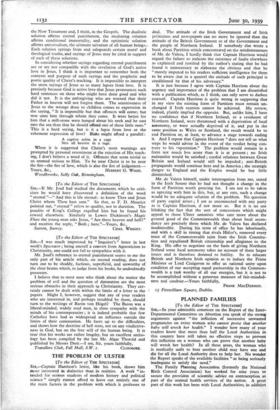THE PROBLEM OF ULSTER [To the Editor of THE SPECTATOR]
SIR,—Captain Harrison's letter, like his book, shows him more interested in dialectics than in realities. A work " in- tended for serious students of modern history and political science " simply cannot afford to leave out entirely one of the main factors in the problem with which it professes to deal. The attitude of the Irish Government and of Irish politicians and newspapers can no more be ignored than the attitude of the British Government or of the Government and the people of Northern Ireland. If somebody else wrote a book about Partition which concentrated on the misdemeanours of Mr. de Valera, I hardly think that Captain Harrison would regard the failure to indicate the existence of faults elsewhere as explained and justified by the author's stating that he had found it unnecessary to elaborate the obvious and that he " merely imputed to his readers sufficient intelligence for them to be aware that in a quarrel the attitude of each principal is conditioned by that of his adversary."
It is just because I agree with Captain Harrison about the urgency and importance of the problem that I am dissatisfied with a publication which, as I think, can only serve to darken counsel. Captain Harrison is quite wrong in supposing that in my view the existing form of Partition must remain un- changed if Irish reunion cannot be achieved. My review, indeed, plainly implied the opposite. But, unlike him, I have no confidence that if Northern Ireland, or a residuum of Northern Ireland, were threatened with a deprivation of local autonomy, or were actually deprived of it, and put in the same position as Wales or Scotland, the result would be to end Partition or, at least, to advance a stage towards ending it. And I repeat that Captain Harrison " does not tell us what steps he would advise in the event of the verdict being con- trary to his expectation." The problem would remain in a form not much less acute than it is at present ; no Irish nationalist would be satisfied ; cordial relations between Great Britain and Ireland would still be impeded ; anti-British propaganda would continue here and in America ; the strategic danger to England and the Empire would be but little diminished.
Mr. de Valera himself, under interrogation from me, stated in the Irish Senate that he had not thought a change in the form of Partition worth pressing for. I am not to be taken as agreeing with him in this, hut, at any rate, such a change would be no adequate solution of the problem. No question of party capital arises ; I am as unconnected with any party as is Captain Harrison, if not more so. But it is no use blinking the fact that the sort of concessions which might appeal to those Ulster unionists who care more about the general good of the Commonwealth than about local ascen- dancy are precisely those which Mr. de Valera has declared inadmissible. During his term of office he has laboriously, and with a skill in timing that rivals Hitler's, removed every trace of the Commonwealth taint from the Irish Constitu- tion and repudiated British citizenship and allegiance to the King. His offer to negotiate on the basis of giving Northern Ireland some local autonomy takes no account of these larger issues and is therefore doomed to futility. So to educate British and Northern Irish opinion as to induce the Prime Minister or Lord Craigavon to offer us national unity upon condition of our accepting equal partnership in the Common- wealth is a task worthy of all our energies, but it is not to be accomplished without a generous measure of fair-minded- ness and candour.—Yours faithfully, 15 Fttzwillia►n Square, Dublin.
FRANK MACDERMOT.










































 Previous page
Previous page